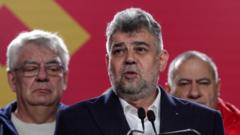In a significant political transition, Friedrich Merz is set to become Germany's new chancellor after leading the Christian Democratic Union to victory in a tumultuous election.
Germany's Political Shift: Friedrich Merz Takes the Helm

Germany's Political Shift: Friedrich Merz Takes the Helm
A look into the challenges and dynamics of Germany's new conservative leadership under Friedrich Merz.
Friedrich Merz, the head of the Christian Democratic Union (CDU), is poised to assume his role as Germany's chancellor on Tuesday, following a six-month void after the previous government's disintegration. His party gained 28.5% of the votes, resulting in a coalition formed with the third-place Social Democrats (SPD) who garnered 16.5%. This leadership marks Merz's return to politics after a decade-long absence, during which he was eclipsed by Angela Merkel.
As Merz prepares to navigate the complexities of governance, he faces an array of pressing issues. The German economy is in decline, worsened by external factors like Trump's tariffs and China's waning demand for exports, alongside high energy costs stemming from sanctions on Russian gas. Additionally, the country grapples with an increasing risk of losing American defense assurances in light of global security tensions, particularly following Russia's invasion of Ukraine. Merz's ability to restore Germany’s pivotal role in Europe will significantly hinge on how he addresses these challenges.



















